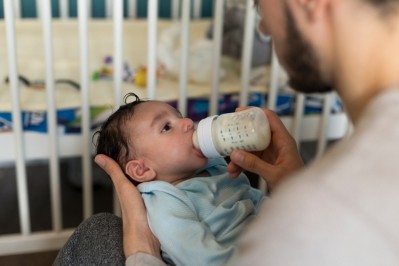Prebiotic fortified infant formula linked to immune biomarkers in infants

While experts agree that “breast is best” for infants, formulas are indispensable in cases where mothers are unable to feed their children—be it for health or logistical reasons.
The new study, published in the Journal of Nutrition, looked at one specific human milk oligosaccharide (HMO) called 2'-fucosyllactose (2’-FL). Infants fed formula with 2’-FL had levels of inflammatory cytokines similar to those observed for breast feeding, and significantly lower than those observed for infants fed a control formula containing no 2’-FL.
“[F]eeding a single HMO (2’-FL), in the context of infant formula, modified innate and adaptive immune profiles to be more like that of a [breastfed] reference group,” wrote the authors, led by Karen Goehring, Research Scientist at Abbott Nutrition.
“These findings indicate that 2’-FL fortification supports aspects of immune development and regulation similar to that in a [breastfed] reference group of infants.
The study is reported to be the first to study the potential benefits of 2’-FL enhancement of infant formula on the developing immune system.
Jump starting the infant’s microbiome
"Nothing can replace breast milk. But for those moms who need or choose to use formula, we are committed to providing the most scientifically advanced nutrition," said Rachael Buck, Ph.D., associate research fellow at Abbott and study author.
"This latest research has led us to our biggest scientific breakthrough in infant formula in nearly a decade—the ability to nourish formula-fed babies with 2'-FL HMO. While it doesn't mean babies won't experience the normal illnesses that come with childhood, these data clearly show that formula with 2'-FL HMO can help strengthen babies' immune systems to be more like breastfed babies."
Dr Buck presented data on 2'-fucosyllactose (2’-FL) at the IPA World Congress + Probiota Americas event earlier this year. To watch a video interview with Dr Buck, please click HERE.
The formula used in the study is available at major US retailers and the Abbott store as Similac Pro-Advance and Similac Pro-Sensitive, both non-GMO. Abbott is the first company to add an HMO to infant formula.
Study details
Goehring and her co-workers performed a sub-study nested within a randomized, double-blind, controlled study with healthy term infants. The infants were either exclusively formula fed (317) or breastfed (107) from five days of age until four months of age. The formula-fed infants were randomly assigned to receive 1 of 3 formulas: The control group was formulated with galacto-oligosaccharides (GOS) only (2.4 grams per liter), while the other groups were formulated with either 0.2 or 1.0 grams of 2′-FL per liter plus 2.2 or 1.4 grams per liter of GOS, respectively.
Results showed that breastfed infants and infants the 2’-FL formulas had 29–83% lower concentrations of inflammatory cytokines, compared to the infants fed the GOS-only formula.
“Cytokines are cell-signaling molecules that regulate both the innate and adaptive immune responses and guide the differentiation and development of immune cells,” explained the researchers. “We found that infants fed 2’-FL–fortified formulas exhibited innate cytokine profiles that were intermediate between breastfed and CF infants and more like breastfed infants. Interestingly, the higher dose of 2’-FL (1 g/L) was not more effective than the lower dose of 2’-FL (0.2 g/L) in modulating cytokine profiles relative to breastfed infants.”
Blood samples taken from a subset of infants in each group at six weeks of age showed no differences in the immune responses of the peripheral blood mononuclear cells (PBMCs) between breastfed infants 2’-FL-formula fed infants.
“With respect to adaptive immunity, we found that 2’-FL narrowed the differences in proportions of total T lymphocytes (including helper T cells and cytotoxic T cells) between breastfed and [control formula]-fed infants,” wrote the researchers. “In addition, 2’-FL narrowed the differences in the percentages of apoptotic cells between [breastfed] and [control formula] groups, in particular with CD8+ T cells and CD8+ T cell subsets.”
Source: Journal of Nutrition
Published online ahead of print, doi: 10.3945/jn.116.236919
“Similar to Those Who Are Breastfed, Infants Fed a Formula Containing 2′-Fucosyllactose Have Lower Inflammatory Cytokines in a Randomized Controlled Trial”
Authors: K.C. Goehring, et al.









